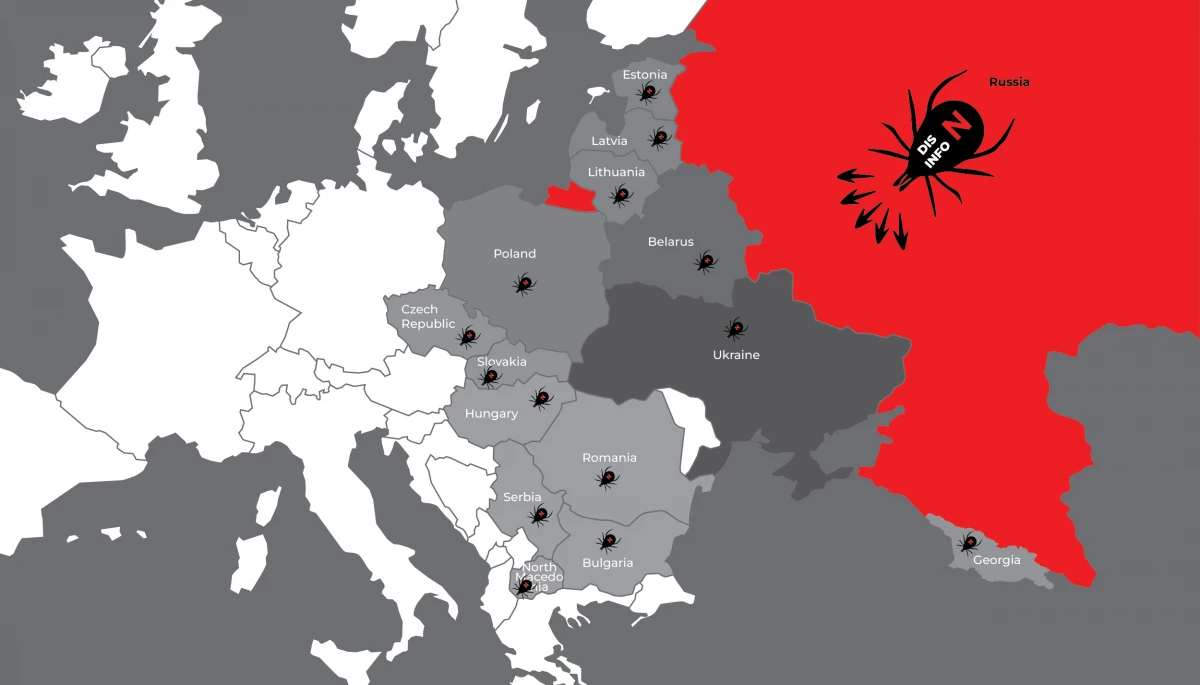In this piece, we examine the prevalent propaganda messages regarding Ukraine that are propagated worldwide by the Russian government.
This article delves into the various messages and narratives frequently employed by Russian propagandists in an effort to shape international perceptions of Ukraine and further Russia’s geopolitical goals. These messages are used to sway public opinion on crucial issues, such as the ongoing war in Ukraine, and influence decision-making on topics like military assistance to Ukraine and the acceptance of Ukrainian refugees. Through research conducted between June and October 2022 by Detector Media analysts in collaboration with partner organisations in 14 Eastern European countries, this article examines the most commonly observed forms of Russian propaganda across social media and traditional media outlets.
Analysts classified disinformation narratives and messages into several main groups: events of the Russian-Ukrainian war; economic consequences of sanctions; disinformation about Ukrainian refugees; ‘discrimination’ of Russian speakers and Russian culture; military assistance to Ukraine; military threats to Eastern Europe.
In total, over five months of monitoring (except for Belarus, Romania and Serbia, where monitoring was conducted during September — October 2022), researchers recorded 6,727 disinformation messages and identified and summarised more than 300 recurring disinformation messages and narratives. Most disinformation was found in social media content — 56.2% of the total number of disinformation messages. Detector Media has identified the most common messages and narratives found during the monitoring and were repeated throughout the media space of several countries, and explains how they work and why Russia needs them.
’Sanctions harm the West more than Russia’
According to the results of 2022, Russia became the most sanctioned country. Sanctions against it were imposed by the European Union (nine sanctions packages), the United Kingdom, the United States, Canada, Switzerland, Australia and Japan. However, Russia is trying to convince everyone that ‘sanctions do not harm it’; moreover, they allegedly ‘only strengthen Russia’.
In the months of June to October 2022, the most frequently disseminated message by Russian propagandists in Eastern Europe was that ‘sanctions are more detrimental to the West than Russia.’ This message was not only prevalent in discussions about the economic consequences of sanctions, but also among all messages spread.
For example, in the Czech Republic, they talked about significant financial reserves, thanks to which Russia does not feel the effect of Western sanctions. They stated that it was time to stop blaming Putin for the rise in fuel prices because it was not Russia that imposed restrictions on the export of coal, oil and natural gas. Inflation and rising prices in Western countries, according to propagandists, are the result of the ‘inept’ policies of the US and European leaders.
Similar messages were spread in the Romanian segment of social media. They claimed that France, Germany, and Great Britain supported the ‘US war against Russia in Ukraine’ and therefore suffered greatly from the economic crisis caused by the sanctions. Therefore, they will no longer support Ukraine.
Additionally, Russian propagandists often portray the implementation of sanctions as an act of aggression toward Russia rather than a response to its aggressive actions.
’Ukraine is losing the war’
This is another common message that was observed in the media space of Eastern Europe. Before the start of the full-scale invasion, the Russian propaganda machine promised that the Russian army would ‘take Kyiv in three days’. The propagandists claimed that ‘Russia will trounce Ukraine because there’s not so much of Ukraine’. This, as we know, did not happen — Ukraine has been resisting Russia for ten months and has no intention of surrendering. However, the propaganda machine continues its attempts to convince the world that ‘Ukraine is losing the war’ and ‘Ukrainians are attacking civilians and committing other war crimes’.
Russia often uses experts with pro-Russian views to promote Russian propaganda narratives. For example, this tactic was used by Russian propaganda in Bulgaria. In particular, the article by ‘Dr. Ilya Ilyiev’ stated that the Russian so-called ‘special military operation’ would soon end with ‘an immense loss for official Kyiv’.
Hungarian Prime Minister Viktor Orban is known for his pro-Russian views; for example, he proposed to lift sanctions against Russia. He said that ‘Europe is shooting itself in the foot’ with the sanctions against Russia. Therefore, Russian propaganda used his statements to spread disinformation narratives. For example, Ramzan Kadyrov praised Orban’s pro-Russian views and the Hungarian president’s prediction that Ukraine would lose a third or even half of its territories.
In the Ukrainian segment of social media, pro-Russian users sought to convince Ukrainians that Ukraine was giving up its demands and losing negotiations with Russia and that the battle for the Donbas would be resolved by Putin’s birthday (October 7, 2022) with Ukraine losing it.
By spreading this message, the Russian propaganda machine is trying to convince the world that Ukraine is weak. Allegedly, it is already losing the war, and therefore it is not worth supporting. Instead, Russia allegedly still remains a strong and invincible country, despite the sanctions and military setbacks.
’Military aid weakens the country that provides it’
Russia is trying to disrupt the supply of Western weapons to Ukraine at any cost. To do this, the Russian propaganda machine carries out disinformation campaigns against countries that provide military assistance to Ukraine. For example, after the adoption of the next package of military aid to Ukraine from the Czech Republic, Russian propaganda tried to convince the Czechs that military aid ‘weakens the country that provides it’, ‘prolongs the war’, and ‘is used for other purposes’.
After Slovakia handed over S-300 air defence systems to Ukraine, the Russian propaganda machine spread fakes on social media that the country was left without adequate air defence. Similar messages were spread on social media about the Baltic countries. They claimed that now Slovakia needed to buy new air defence systems instead of those provided to Ukraine. The propaganda machine reacted in a similar way to the transfer of T-72 tanks by North Macedonia to Ukraine.
The Polish audience was told that the country would continue disarming itself by transferring weapons to Ukraine, despite the fact that Poland would be the next target for a Russian attack. Propagandists claimed that unarmed Poland would have no chance to defend itself against the Russian aggressor.
Russian propagandists are attempting to sway international opinion by suggesting that any weapons supplied to Ukraine will not be used for defensive purposes but rather to commit atrocities against civilians in the occupied regions of Ukraine or even in Russia. They argue that by providing weapons to Ukraine, the West is complicit in these supposed war crimes.
’EU/NATO/West are weak and will soon collapse’
To spread this message, the Russian propaganda machine mostly uses tactics of manipulating emotions, in particular, fear. For example, it tried to intimidate Lithuanians by suggesting that NATO would not be able to protect their country. Allegedly, NATO Air Policing (a special mission to keep fighter jets and crews in the airspace of NATO countries around the clock, ready to respond quickly to possible violations) is staffed by ‘total drunks’ who will not be able to protect the country’s airspace when needed.
Russian propagandists tried to intimidate Estonians by claiming that in the event of a full-scale war with Russia, NATO may refuse to apply the fifth article of the North Atlantic Treaty, which states that an attack on one NATO state is considered an attack on the entire bloc. Propagandists claimed that it is highly likely that the allied forces, in this case, would be directed not to the defence of a particular country but to ‘more important’ military or strategic tasks. In other words, Estonia may have to deal with Russia on its own. In Serbia, the message about the weakness of the West was reduced to the notion ‘The West will fall’. To promote it, the Russian propaganda machine claimed that the use of Iranian drones in Ukraine allegedly gives Russia a significant advantage over Western weapons. Allegedly, the West cannot do anything about this problem, so it is bound to ‘lose’.
Belarusian Telegram channels claimed that ‘no one wants to fight Russia, except for the Poles and a small number of people in Washington’. They suggested that if NATO continues to move towards war with Russia, the alliance may collapse. Russian propagandists used similar tactics in other countries that are not members of NATO: ridiculing, humiliating, undermining their enemy (the US/NATO/’collective West’) and glorifying Russia.
’Russophobia and attacks on Russian culture’
A prevalent narrative in Eastern European countries is the concept of ‘Russophobia,’ which Russian propaganda portrays as a biassed, suspicious, or hostile attitude towards Russians, Russia, or the Russian language. However, this term is often used as a tactic to substitute the idea of avoiding toxic Russian influence with an alleged fear of Russians. The prejudiced and hostile attitude towards Russians, if anything, was formed solely as a response to their arrogant and disrespectful behaviour abroad, as well as because of Russia’s aggressive international politics in general and the fact that it was Russia that started the war in Ukraine.
Russians accused Estonia of Russophobia for refusing to issue visas to citizens of Russia and Belarus. On the other hand, Russian propagandists disseminated a fake in the Ukrainian media space claiming that the European Parliament considers the ban on issuing visas to Russians ‘illegal’. The Russian propaganda machine also claimed that the ban on Schengen visas for Russians is discrimination on a national basis. In the Latvian segment of social media, the initiative to rename locations with names of Russian origin was described as Russophobia.
Using this narrative, propagandists wrote in the Georgian segment of social media that the West is forcing Georgia to follow its own example and treat Russians unfairly. They claimed that the West and its proxies in Georgia do not care about human rights when it comes to Russians because Russians are enemies. Allegedly, a similar fate awaits Georgians if they do not comply with the demands of the West.
The Russian propaganda machine presents Russia and its citizens as ‘victims of hostile treatment’, although it is Russia and Russians who are the aggressors. The propagandists justified the full-scale invasion of Ukraine with the alleged spreading of Russophobia in Ukraine.
’Ukrainian refugees undermine the internal stability of the countries that host them’
The full-scale invasion forced almost five million Ukrainians abroad in order to escape Russian military assault. Poland sheltered most Ukrainians who needed help. However, in an attempt to discredit Ukraine’s allies, Russian propagandists claimed that ‘Ukrainians have priority over the residents of the country that hosts them’. Propaganda also tried to discredit Ukrainian refugees in every possible way, claiming that ‘Ukrainian refugees are arrogant and ungrateful’.
For example, in Estonia, propagandists claimed that the mass influx of Ukrainian refugees was an ‘emotional decision’ of the Estonian government, and ‘the reality is unpleasant’, as there is allegedly not enough housing to accommodate Ukrainian refugees, Ukrainians cannot afford the rent, there are conflicts between Ukrainians and Estonians, etc. In the Georgian segment of social media, there were propaganda messages claiming that Ukrainian refugees could significantly affect the political situation in Georgia if they started participating in rallies and protests. Lithuanians were being intimidated on social media with stories about a refugee murderer who allegedly wrote ‘glory to Ukraine’ after killing his father.
Russian propaganda employs a tactic of discrediting the image of Ukrainian refugees in the eyes of foreign countries in order to deprive them of support. By spreading messages about the poor living conditions of refugees abroad, they aim to convince Ukrainians not to seek refuge elsewhere and to instead ‘negotiate with Russia’. In-depth information on this topic can be found in the research by Detector Media.
This publication has been produced with the financial assistance of the European Union. Its contents are the sole responsibility of Detector Media and do not necessarily reflect the views of the European Union.



